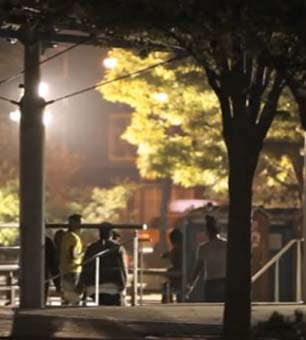 Out in the Night. (Screengrab via Out In The Night: self defense / Vimeo)If you’re a black woman, do you have the right to defend yourself when attacked? What if you’re a black lesbian? What if you’re a black, gender non-conforming lesbian and your attacker is a heterosexual man? Do you still have that right?
Out in the Night. (Screengrab via Out In The Night: self defense / Vimeo)If you’re a black woman, do you have the right to defend yourself when attacked? What if you’re a black lesbian? What if you’re a black, gender non-conforming lesbian and your attacker is a heterosexual man? Do you still have that right?
Out in the Night challenges us to consider these questions. The documentary follows the case of Venice Brown, Terrain Dandridge, Renata Hill and Patreese Johnson, four women who became known as the New Jersey Four after defending themselves against attack.
Truthout readers may remember the case: In August 2006, seven young women from Newark, New Jersey, took the train to New York’s West Village, a neighborhood historically known for its LGBTQ friendliness. As they walked down the street, they were sexually harassed by a man named Dwayne Buckle. Buckle followed them, threatening to rape them, and then physically attacked, choking one, ripping hair from their scalps and spitting on them. The women defended themselves and, at some point, were assisted by two unknown men. During the altercation, Buckle was stabbed. The women were arrested while the men left the scene.
All seven were black lesbians. In addition, three were masculine-appearing. Media played on both their race and gender presentation, labeling them as a “lesbian wolf pack” and “killer lesbians.” The man was described as an “admirer” rather than as a homophobe or the instigator of the attack.
Three of the women accepted plea bargains and served six months; the remaining four – Venice Brown, Terrain Dandridge, Renata Hill and Patreese Johnson – became known as the New Jersey Four; they pled not guilty. They were initially convicted and received sentences ranging from three-and-a-half to 11 years in prison.
Out in the Night moves beyond the court case and fear-mongering headlines to examine the lives of each of the women as individual people with families and community connections. Filmmaker Blair Doroshwalther interviews Renata and Terrain about their friendship and coming out to their families. Patreese’s siblings are also interviewed. All four women’s families were accepting of their sexual orientation, but they note, people on the streets of Newark were not.
The film recounts the 2003 murder of Sakia Gunn, a 15-year-old black lesbian. In startling similarity to the attack that happened three years later, Gunn was returning from New York City’s West Village. As she and her friends waited for the bus in downtown Newark, they were propositioned by two black men. When the women told them that they were lesbians, the men attacked. One of the men stabbed Gunn in the chest. Her friends flagged down a taxi and took her to the hospital, where she died. While they were not close friends, two of the women knew Sakia Gunn and all four had been shaken by her murder.
“I feel like I’m more of a target than anything else,” says Renata, after her attacks by both Buckle and the legal system. Out in the Night challenges viewers to rethink safety, particularly for LGBTQ people of color.
Out in the Night begins screenings in several cities this month. For dates, times and locations, visit https://www.outinthenight.com/.
Join us in defending the truth before it’s too late
The future of independent journalism is uncertain, and the consequences of losing it are too grave to ignore. To ensure Truthout remains safe, strong, and free, we need to raise $50,000 in the next 10 days. Every dollar raised goes directly toward the costs of producing news you can trust.
Please give what you can — because by supporting us with a tax-deductible donation, you’re not just preserving a source of news, you’re helping to safeguard what’s left of our democracy.